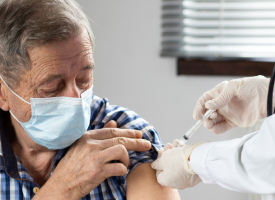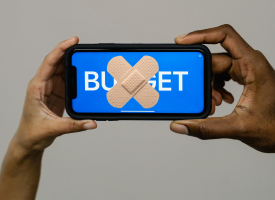Transcript - Dr Gannon - 6PR - Vaccinations, Emergency Departments
Transcript: AMA President, Dr Michael Gannon, 6PR, Perth Live With Oliver Peterson, Monday 26 February 2018
Subject: Vaccinations, Emergency Departments
OLIVER PETERSON: This is really alarming, that Australian children are falling behind on immunisation. This is research that's been conducted by the Australian Research Alliance for Children and Youth, and joining me to discuss, Dr Michael Gannon from the Australian Medical Association. He is the National President. Michael Gannon, good afternoon.
MICHAEL GANNON: Good afternoon, Ollie. How are you?
OLIVER PETERSON: I'm good, Michael. We're seeing that this becomes increasingly in vogue at the moment, to question whether or not you need to vaccinate your children. It's a worrying trend if we're falling behind, according to this report, that two-year-olds who had been fully immunised has fallen from 92.7 per cent in 2008 to 90.5 per cent in December 2017, so we're down about 2 per cent. What's going on?
MICHAEL GANNON: Well, I don't know. I'm inclined to tear my hair out. It is the most effective public health measure we've got. What we've witnessed in Australia in recent months are loud yells to license a meningococcal vaccine, and at the same time we're seeing a drop in the number of people protecting themselves against other, less visible forms of viral and bacterial infection. It makes no sense; it's hugely disappointing. I think that in fairness, the Government, the Health Department, and I can tell you the profession, we're wringing our hands trying to work out what exactly we need to do to get the message through to people.
OLIVER PETERSON: Exactly. We're taking the advice here of the public health officials of every Health Minister around the country, of every doctor around the country, who say you must immunise your children, yet ultimately we're seeing a decline in the number of parents deciding to get their children vaccinated. As you know, Dr Gannon, I'm about to have a child, and that scares me to think that everybody in a day care or in a school or in a classroom might not be vaccinated.
MICHAEL GANNON: Well, you're exactly right, and this is the fear that prospective parents, new parents, and others face. And let's face it, we also face it on behalf of other people we care about as well, because there are vaccine-preventable illnesses that maim adults, and they maim elderly relatives and loved ones at that stage of their life as well. There is not a single credible voice anywhere on the planet that argues against national immunisation programs like we enjoy in Australia and in other developed nations. In the third world, people walk their children sometimes 10, 20, 30 kilometres to get to a vaccination caravan to get protection against things like polio.
It is utterly ridiculous that we see this laziness. I don't think that it's the lunacy of the anti-vaccination movement that's getting hold of people, but I think in the backs of minds of a lot of people, they listen to these negative health messages from non-reputable sources and then maybe, just maybe, that contributes to people not making the time, not making the effort to get there and get their kids vaccinated. I've got to tell you, I find these statistics very troubling.
OLIVER PETERSON: Yeah, because if we read into that report, that's one in 10 children who are falling behind in their vaccinations. And I know the conversations Amy and I are already having, Dr Gannon, around when the baby is born later this year, is making sure anybody who comes to visit our baby has also had their vaccinations up to scratch.
MICHAEL GANNON: Well, what's absolutely essential is that pregnant women are advised by whoever's looking after them – a GP, obstetrician, midwife – to avail themselves of the free vaccination against influenza and whooping cough. And of course, we would then encourage those same mothers to have their children vaccinated according to the National Immunisation Program against things like diphtheria, tetanus and polio, measles, mumps, rubella. Now we've got protection at various stages in life against the top three causes of bacterial meningitis. These are good news stories.
One of my councillors was at a meeting last week. We're trying to beat rheumatic heart disease. The way to beat that is to develop a vaccine against the bacteria called group A strep. We're really excited about this. This is what's going on at an international level. We're trying to eliminate polio in the two countries on the planet where it still exists. And yet back in Australia, I'm arguing with nutters on the internet and people who are just too lazy because they haven't seen these infections to protect their children and other loved ones.
OLIVER PETERSON: Yeah. I've got to ask you as well this afternoon, Dr Gannon: George Christensen, the outspoken Nationals MP, today is saying that everyone has the right to use hospital emergency departments as an alternative to paying to see a GP. So he's effectively saying let's go and clog up the EDs. That'd frustrate you, no doubt.
MICHAEL GANNON: Well, these are unfortunate comments from someone who put himself up to be Deputy Prime Minister, and with these comments showed himself to be well short of that level, I'm afraid I have to say. The reality is that you're not talking the same thing when you compare what my colleagues who work in emergency departments do to what my colleagues who are general practitioners do.
GPs are specialists in primary care, so for a start they're a lot better trained for the kind of presentations he's talking about, and the reality is is that if you go and see a GP, we're still at 85 per cent bulk billing around Australia. Most people pay nothing to do it, but whatever it is, the total cost to see a GP is something like an average of $50. The same presentation to a hospital emergency department costs $180, so this is irresponsible advice. He's wrong. He doesn't understand the difference between emergency medicine and general practice.
We're very, very fortunate in Australia to have a highly trained, skilful, specialist GP workforce, and they represent better value for money than anything else I know in our community. George Christensen's got it wrong again.
OLIVER PETERSON: Yeah, and for the moment as well, Dr Gannon, we still have the after-hour medical services that can come to your home, and you can bulk bill those. So there's plenty of opportunities if you're in need of medical assistance.
MICHAEL GANNON: Well, they have an important role as well, and so we're going to see some reforms in that area. There might have been a little bit of over-generous billing of so-called urgent item numbers. Again, it really saddens me that people don't see the value they get from having their own GP. They're there, working hard Monday to Friday, often extended hours, often Saturday mornings, Sunday mornings. They are the specialists in preventative health. They are the specialists in primary care. That should be your first port of call for most health problems.
OLIVER PETERSON: Dr Michael Gannon, appreciate your time on Perth Live. Thank you very much.
MICHAEL GANNON: Pleasure, Ollie.
OLIVER PETERSON: The National President of the Australian Medical Association, Dr Michael Gannon there.
27 February 2018
CONTACT: Maria Hawthorne 02 6270 5478 / 0427 209 753
Follow the AMA Media on Twitter: http://twitter.com/ama_media
Follow the AMA President on Twitter: http://twitter.com/amapresident
Follow Australian Medicine on Twitter: https://twitter.com/amaausmed
Like the AMA on Facebook https://www.facebook.com/AustralianMedicalAssociation



